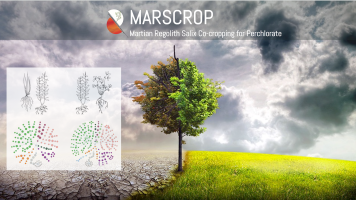A nutritious, resilient and safe food source is essential for safeguarding astronaut health and metabolism. Findings from Viking and Phoenix Mars landers have revealed widespread presence of perchlorates in Martian regolith at concentrations toxic to humans and most plants and bacteria[1-6]. The MARSCROP project will explore the use of perchlorate reducing bacteria recently identified in association with phytoremediation and perchlorate tolerant willow roots[7-9] to mitigate regolith toxicity in situ and determine the potential for co-cropping to produce safe fresh food for astronauts within controlled environments on the surface of Mars. The mechanisms of observed perchlorate(s) reduction will be determined in Martian regolith-like media with leading-edge multi-omic techniques as well as target bacterial strain inoculation. Our research into co-cropping[9] has demonstrated collective resilience of selected crops to diverse soil contamination is driven by complementary functions of rhizosphere-associated bacteria. We will therefore also explore perchlorate accumulation in Solanum lycopersicum (tomato) and the nitrogen-fixing Glycine max (protein-rich soybean) when co-cropped willow. As i) perchlorates are abundant environmental contaminants resulting from agriculture and munitions use, and ii) shared rhizosphere functionality from co-cropping is a research priority within urban agriculture, the project will benefit from collaborative support from a phytoremediation biotechnology company and an urban agriculture company, in addition to support from academic collaborators across Europe, Canada and the US. We will therefore aim to harness naturally evolved biological systems to help solve complex challenges on earth, while also taking important steps towards a strategy to safeguard astronaut health on the Martian surface.

